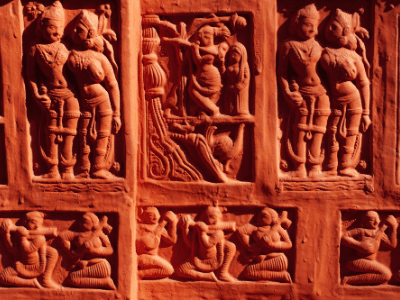

Perhaps you've known people who have used the numerology alphabet values to better understand themselves, predict their future, and plan their successes.
If so, you've likely wondered how you might be able to incorporate this tool into your own life.
However, it can look incredibly complex, and there are so many different types of numerology that you may not know where to start.
In this article, we'll help you understand the basics of the numerology alphabet, with a focus on the power of Chaldean Numerology.
We'll start with a brief primer on the numerology alphabet – what it is, and how we derive the numerology of names.
Next, we'll work our way through the meaning of alphabet numbers before digging into the specifics of the Chaldean Numerology alphabet and what each letter means.
Finally, we'll contrast the good alphabet numbers with the bad alphabet numbers and help you understand how you can use both to learn more about yourself.
Perhaps you've seen online numerology calculators and have wondered what actually happens when you put your name into them.
How is the result calculated, and what can alphabet numerology really tell you about yourself?
As it turns out, there's a specific process you need to use if you want to get the right information about your name and traits.
With this in mind, let's look at how you make accurate calculations using the numerology alphabet, and then explore an overview of what specific numbers mean.
To figure out your name numerology number by using the number chart relevant to Chaldean numerology.
You use a list of numbers to discover the value associated with each letter.
Then you add all the relevant numbers together to find your numerology name meaning.
The number correlations are as follows (and note that unlike other forms of numerology, 9 is not included):
A, I, J, Q, Y = 1
B, K, R = 2
C, G, L, S = 3
D, M, T = 4
E, H, N, X = 5
U, V, W = 6
O, Z = 7
F, P = 8
So, for example, if your name is Ted, name numerology tells you to add 4 + 5 + 4 to get a total of 13.
If your number is over 8 and isn’t the special numbers of 11 and 22, you then add the two digits of the number together to get a smaller, final number (in this case, 4).
All forms of numerology teach that the meaning of numbers reveals both good and bad aspects of your character.
This is useful in helping you understand how to maximize your strengths and work on your weaknesses.
The below list captures at least some of the key meanings associated with each number.
1: Bravery and ingenuity; self-absorption and over-confident.
2: Empathy and a balanced perspective; easy offense and self-doubt.
3: Artistry and out-of-the-box thinking; melancholy and carelessness.
4: Pragmatism and logic; attraction to conflict and coldness.
5: Spontaneity and playfulness; over-commitment and avoidance.
6: Commitment and compassion; anxiety and a need for approval.
7: Deep spirituality and understanding; arrogance and apathy.
8: Insight and rationality; shallowness and desire to please others.
9: Kindness and empathy; fluctuating moods and scatterbrainedness.
11: Creativity and accurate predictions; social anxiety and a lack of practicality.
22: Leadership and responsibility; ambivalence and over-use of power.
Of all types of numerology, Chaldean Numerology is probably the least well-known. In spite of this, however, it can provide powerful and unusually accurate insights into who you are and what you need.
Some consider it to be the mother of all numerology practices, though it's difficult to prove which system was derived precisely when.
Those who practice it believe that we all have an innate destiny and that uncovering facts about that destiny can help us live in accordance with our true purpose. You can use it to calculate information about your truest, most authentic self as well.
It is an especially helpful method to reach for when you want to know what's going on within your subconscious and how others are influencing your success as well.
The catch is that it involves a more complex toolkit that is perhaps less intuitive than other approaches to numerology.
Shortly, we'll turn to the simplest ways to apply the Chaldean methodology to your name, looking at both the ‘good’ and ‘bad’ aspects of each relevant number.
First, however, it's helpful to dig a little deeper into the origins of this approach to numerology and to understand what those who pioneered it believed.

Chaldeans hailed from Chaldea in the Middle East – what we would now call southern Iraq – from 625 to 539 BC.
As noted above, Chaldeans held a commitment to the idea of us having a true, immutable self. In addition, Chaldean history also involved unique spiritual commitments.
Chaldean people prayed to one Supreme God and a hierarchy of archangels and subordinate angels. Chaldeans derived their numerology system from analysis of how planets moved and appeared to impact personality and destiny.
The core underlying principle of Chaldean Numerology is that all letters from 1-8 carry specific vibrational energy. Unlike in standard astrology, 9 is not included due to its status as a sacred number.
After its inception, Chaldean Numerology traveled to ancient India and Greece.
Now, Chaldean Numerology is enjoying a renaissance, and you can use it in combination with other forms of numerology to learn the most about yourself, your unique talents, and the blocks you need to overcome.
Chaldean numerology matches numbers to letters in the same way we listed near the start of this guide.
However, Chaldean number theory arguably provides a deeper sense of the ‘good and bad' meanings of all numbers.
To see this, let's take the name Eliot.
This works out as E=5 + L=3 + I=1 + O=7 + T=4 = 20.
The name total of 20 reduces to the name total of 2.
Chaldean alphabet numerology highlights the favorable aspects of this number, suggesting that Eliot is an intuitive, insightful person who is a natural mediator, able to see both sides of all disputes.
This suggests a potential attraction to counseling or professions in the justice system.
Chaldean numerology of names is based on the fundamental principle that all numbers carry a positive and negative charge.
So, to use another example, let's see what the numerology alphabet tells us about someone with the name Alice.
This would give us the calculation A=1, L=3, I=1, C=3, E=5, which results in the number 13.
We then add 3+1 to get Alice's core Chaldean number of 4.
The dark side of 4 is all about aggressiveness, impatience, and emotional removal, which tells us that Alice will benefit from working on empathy and careful listening in relationships if she is to be successful and fulfilled.
As we've suggested throughout, different types of numerology all provide us with subtly different ways of understanding our fundamental nature and the challenges we face.
Here, we've focused on what we can learn by applying Chaldean numerology, which emphasizes that there is a dark and a light side to every number.
However, all other forms of numerology have their strengths as well, so they're all worth exploring. For example, Pythagorean numerology focuses on calculating your destiny, helping you to understand your real purpose in life.
Meanwhile, Kabbalah numerology is a simple approach to name numerology that is famously helping if you're trying to understand how your insecurities and defenses might be holding you back.
Further types include Vedic numerology, which gives particular attention to how the year of your birth shapes the opportunities you'll have – and how to make the best of those opportunities.
